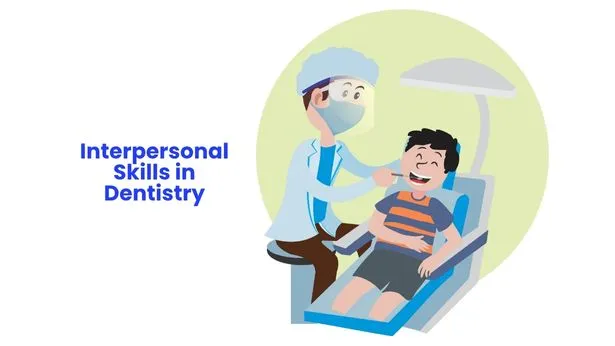Top Soft Skills for a Thriving Dental Career
Soft skills for dentists are as important as clinical knowledge. While technical education guarantees efficient treatment, excellent interpersonal skills ensure trust-building, improving patient interactions, and overall practice success. Whether starting out or moving ahead in the profession, honing these skills can benefit your long-term career development significantly.Building Strong Foundations: Key Interpersonal Skills in Dentistry

Mastering these essential skills for dental professionals is essential for patient trust, treatment success, and a well-rounded dental career. These human-centric abilities turn good dentists into exceptional professionals.
1. Empathy and compassion: Dentistry is not just about clinical techniques—it’s about individuals. Numerous patients come in with dread or apprehension, and showing empathy can ease them up.
Allowing patients to explain their concerns, listening attentively, and being friendly makes patients feel understood and appreciated. Empathetic care builds enduring relationships and enhances patient loyalty.
2. Communication skills in dentistry: Effective communication is one of the foundations of a successful dental career. Whether communicating treatment procedures with patients or working with colleagues, clear expression and active listening are crucial.
Use plain language when interacting with patients to make sure they get it, and professional jargon with colleagues. Effective communication promotes confidence and minimizes errors.
3. Attention to detail: A keen sense of detail is a requirement in dental practice. From the detection of initial symptoms of dental problems to maintaining accurate patient files, there is a high emphasis on precision in order to provide quality service.
Ignoring minute issues may develop into complications, and thus meticulousness in all aspects of work is crucial for uniform, high-quality service.
4. Patience and emotional resilience: Dental practitioners continuously encounter stressful situations, such as challenging patients or surprise issues during procedures. Having patience facilitates composed, with-held reactions, while emotional resilience prevents stress from interfering with work.
Being able to remain calm in pressure situations proves professionalism and solidifies patient and team trust.
5. Dental career success tips: No dental practice functions effectively without collaboration. Working with dental assistants, hygienists, administrative staff, and other professionals promotes a smooth operation.
Effective communication, shared tasks, and support result in a more positive work environment. Good collaboration results in better outcomes and patient satisfaction.
6. Problem-solving and adaptability: Dental professionals may be faced with surprise situations—be it an unexpected equipment malfunction or a shift in patient attitude. Adaptability and quick thinking are essential here.
Being able to think through a situation and come up with viable alternatives helps maintain seamless, unbroken care. Maturity and resourcefulness are also indicated in being able to handle change.
Also Read: Highest Paying Dental Jobs
7. Time management and organization: Balancing several tasks is a part of daily dental practice. Appointments, follow-ups, paper work, and procedures all require attention. Good time management by prioritizing, planning according to a set schedule, and maintaining a clean work area enhances productivity and avoids delays. Effective time management leads to stress-free and productive workdays.
8. Critical skills for dental professionals: Not all leadership is at the management level. Initiative to mentor new employees, recommend changes in workflow, or keep abreast of dental innovations demonstrates commitment. These attitudes motivate others and raise the standards of the practice. Leadership and initiative lead to opportunities for advancement and more responsibility.
9. Stress management and self-care: A dental career can be physically and emotionally challenging. Stress management is crucial to prevent burnout and sustain performance. Engaging in regular self-care—like exercising, meditating, or doing things with family and friends—allows for balance.
Identifying stressors early and working on them helps ensure long-term success in a dental career and sound mental health.
10. How to succeed in a dental career: professionalism and ethics: Strong ethics and professionalism are the foundation of a respected dental practice. Maintaining patient confidentiality, being honest about treatment options, and following industry guidelines reflect integrity.
Consistent reliability, respectful conduct, and dedication to ongoing learning position dental professionals for trust, respect, and career advancement.
Final Outcome on Dental Career Success Tips

Building solid soft skills for dentists is essential to providing outstanding care and ensuring a successful dental career. With improved communication skills in dentistry, adopting important dental career success tips, and developing core skills for dental professionals, you make a positive difference for both patients and your career. Investing here leads to long-term success in the dental profession.
Looking to grow professionally in your dental career? Choose one soft skill to improve, whether it’s time management, empathy, or leadership, and apply it consistently in your daily practice. Small changes lead to significant progress and long-term success in dental careers. Contact Hire Smiles and let us support your journey to becoming a well-rounded dental professional.
FAQs on Soft Skills For a Successful Dental Career
Q1. Why are soft skills valuable in dentistry?
They enhance patient experiences, enhance teamwork, and enhance workplace effectiveness.
Q2. What is the most important soft skill for a dental professional?
The most important soft skills are effective communication that fosters trust, enhances understanding, and maximizes treatment outcomes.
Q3. How can I enhance my empathy towards patients?
To enhance the empathy towards patients, always listen attentively, validate their concerns, and have a caring, supportive attitude.
Q4. What is the importance of teamwork in dental career success?
The importance of teamwork simplifies operations and results in a positive, friendly work culture.
Q5. How do I manage stress well as a dental professional?
Make stress-reducing activities such as exercise, mindfulness, and time management part of your daily routine.
Q6. Why is flexibility essential in dentistry?
Dentists encounter new technology, patient requirements, and clinic surprises and adaptability ensures that care remains uniform and professional.
Q7. What makes a great leader in the dental profession?
The initiatives towards proactive problem-solving, mentoring, and assuming initiative to enhance practice operations and care for patients.
Q8. In what ways can professionalism influence career development?
Practicing ethics, dependability, and continuous self-development improves your image and creates career opportunities.
Related Article: Essential Dental Forums for Professionals





